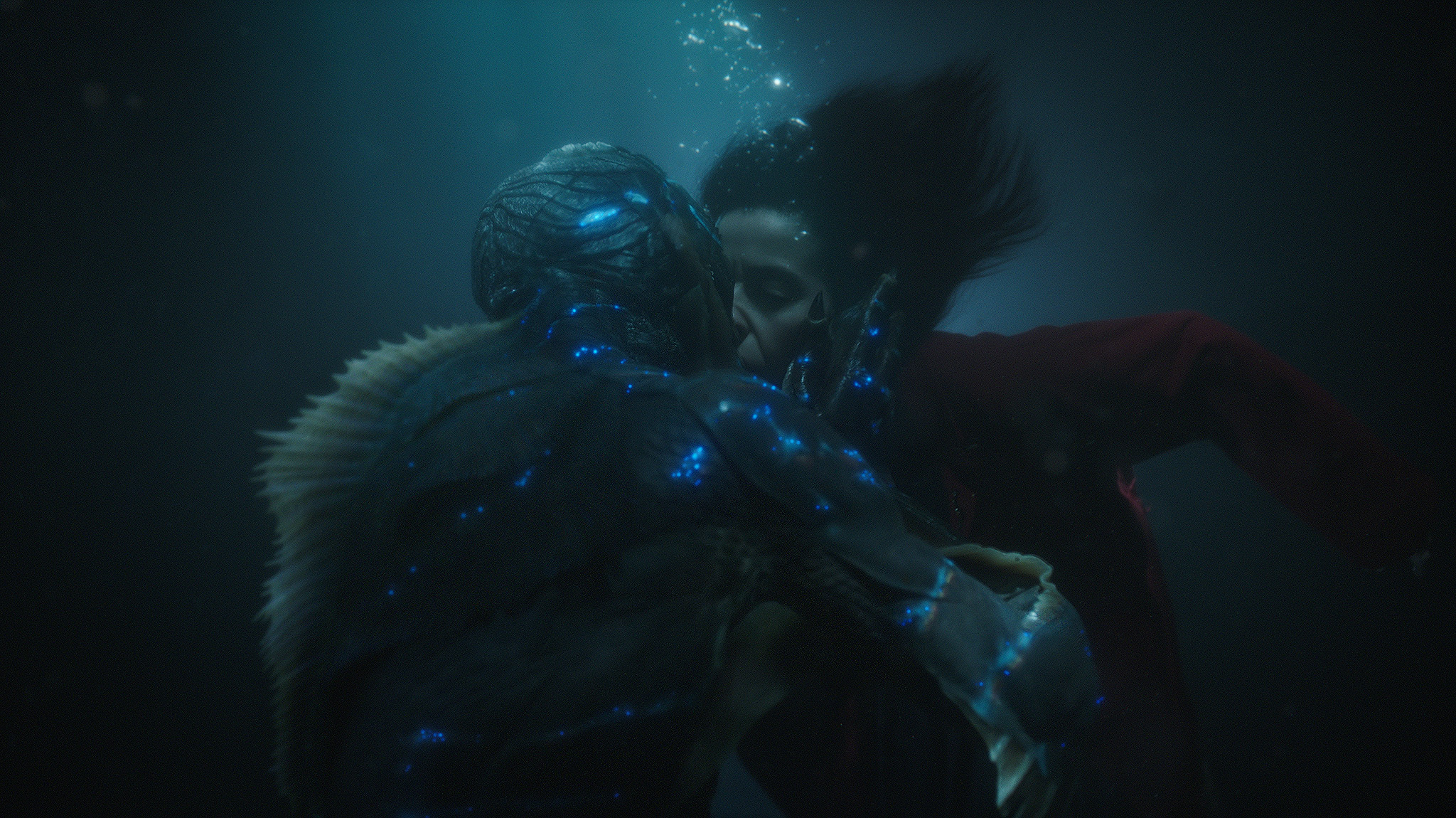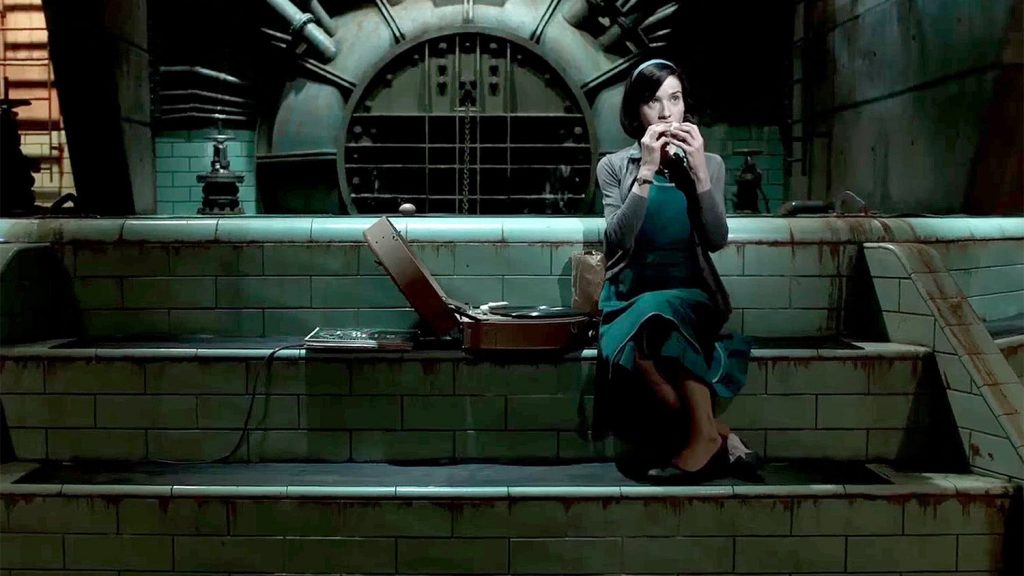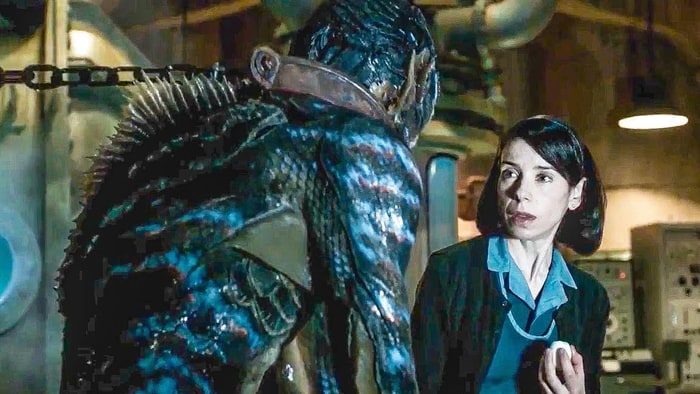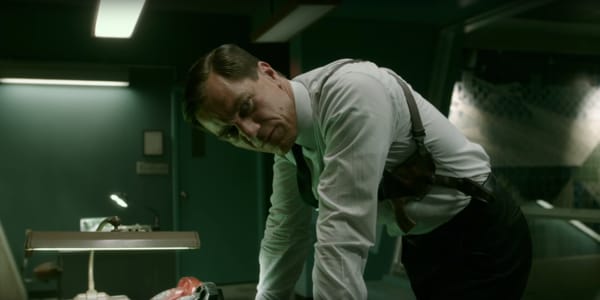The Shape of Water is barnstorming Hollywood. With it’s 2 Golden Globe wins (Best Director and Best Original Score) and yesterday’s 13 Oscar nominations, everyone is talking about this backwards, minimalist, love story. Which, is funny, because I had it on my list to bring it to you as a highlight of 2017 for a while now. And stuff that we dig here very rarely gets picked up by the wider Hollywood scuttlebutt. But hey, maybe that’s a good sign about Hollywood and it’s natural predilections… yeah, I know, I’m smoking something. I agree.
Even a blind squirrel finds a nut every now and again! hahaha.
Regardless, I’d be an idiot not to rush this movie discussion post to the front of my list of movies to talk about. Because, suddenly? Everyone is going to be watching this movie and going… WHAT THE HECK?!? And with good reason. This isn’t exactly a simple movie to unravel. So, if this is your first time here on THiNC… welcome. I normally give a high level spoiler free overview of the movie and then kick out everyone that hasn’t seen it. Then we dive into the details of the movie and try to see if the post mortem will enlighten us any as to the inner working of the patient currently laying here on our slab. (OK SO THE ANALOGY SORT OF DETERIORATED. WHAT OF IT?!?)
The Shape Of Water Overview
The story of The Shape of Water movie is simple. A woman, cleaning in a clandestine government facility interacts with a crazy looking merman type being. She falls in love, and she struggles against the scientists of the facility in order to save the strange water creature. Or something like that. Maybe I should let the trailer synopsize for me:
So maybe it’s a reverse ET, with a love story? Or something? Yeah, I’m awful at synopsizing, apparently. And this is where we start deep diving on the movie. So if you haven’t seen it yet, please do us all a favor and do so. But come back! Because we want you to participate in the conversation. But, just not right now.
The Shape of Water Characters
The opening of the movie is unapologetically a character primer. So, why don’t we just make sure we know who we are dealing with in Del Toro’s The Shape of Water:
Elisa Esposito: The mute and lonely woman that works at a top secret research facility that works with various high priority “assets”. Elisa is severely lacking in the friend department, and tends to spend her time watching old musical movies with Giles.
Richard Strickland: The security lead that is responsible for the secretive research facility’s most important science research assets. Strickland has issues, and probably wasn’t adequately loved by his mother. We do know for a fact he wasn’t breastfeed as a baby, that much is sure. Regardless, Strickland is more interested in cutting the asset up and studying its organs than actually learning from it.
Giles: The older neighbor of Elisa’s and companion. He enjoys old movies and happens to be gay… which ends any sort of romantic ideas between Elisa and Giles. He also has been recently laid off by as an artist for an advertising agency that Giles keeps trying to do contract work for them, ineffectively.
Dr. Robert Hoffstetler: is the scientist in charge of the merman creature. But more importantly, he is a German double agent. He would like to steal the asset for Germany. But Germany is more interested in keeping America from having it, and it being dead is just fine with them.
Zelda Fuller: Elisa’s one and only work friend, and the one that assists Elisa in her heist of the merman fellow.
The Shape of Water and Magical Realism
You may not know what the term Magical Realism is, but you know it when you see it… I promise. A few good examples of Magical Realism include, Midnight in Paris, Amelie, Pan’s Labyrinth, and the best movie coming to mind right now would be M. Night Shyamalan’s Lady in the Water. (huh, sensing a bit of a water theme here in this magical realism bidness mate. (That was my best Cockney accent, yeah, I’m sorry Cockney-ites? Cockneyians? Cocknilians? I should just stop.)) And actually? Magical Realism is EVERYWHERE in the literature scene. Jorge Luis Borges, Salman Rushdie, Isabel Allende, and heck, the grand daddy of them all, and one of my favorites, Kafka.
The problem though? Magical Realism breaks our western minds. Our collective disdain for myths, allegories and legends, just really means that stories told from a Fabulistic (Fabulism is just another name for Magical Realism) bent are usually just lost on us. So that Del Toro’s acclaim from the Academy, and the Globes is fairly strange. Sure, in Latin America? Fabulism is normal and everyday. But here? Nah.
But the over all sense of Magical Realism is that we are watching reality through a bit of a stain glass window. Of sorts. Or something. (OH! SPLASH! That is a perfect example that most American audiences would remember, that was a Magically Realistic story. It’s real New York… but real New York with a flipping (literally) Mermaid in it. (Oh, I’m sorry, that sentence made me laugh out loud. If you are not laughing along, let’s just agree now that this site just isn’t for you.)) Usually the point of Magical Realism is to give the reader or viewer an avant-garde modernist view of life while extolling the mystery of human living amongst the heaviness and the reality of real life. So it balances the stress and chaos of life with the wonderment of magic and accentuates both in the process.
Right?
Yeah, I got way way too bookish right there. I unreservedly apologize for that. (No I actually don’t, I’m just saying that I’m sorry when I really am not.) And I know that readers should work hard to learn when reading (Of all the lies I’ve told, that is one of the biggest, and I disagree with that previous statement so much that I’m laughing out loud.) in order to understand their entertainment – heck, when we have fun, there should be no thinking at all involved. (I’m not even going to comment here. If you are not picking up what I am putting down, let’s just part ways now. Puh-lease.)
The Story of The Shape of Water
As I’ve alluded to earlier, the story is as old as stories come. And it’s about as simple as they get, though fantastic in every way. After meeting the characters we realize that they are headed towards a quickly escalating collision. Elisa is falling in love with the Amphibian Man (as the credits moniker him). And Strickland is simultaneously falling into hate with the merman/amphibian man. And so, Strickland decides they are going to dissect the asset the next morning against the objections of Hoffstetler.
Well, that doesn’t work for Elisa, not even a little bit. So she convinces Giles to join in after absolutely everything else crumbles around him. And so Giles forges some identification papers, tricks out his truck, and then they steal into the facility. After a few near misses, Elisa is able to sneak Amphibian man out and into her bath tub. (Hoffstetler: “One container of these salts in his water every day.” Cause, yeah, that’s how that works. hahaha. I had a hundred gallon salt tank back in the day, and I have to tell you, keeping that thing balanced and tuned was one of the hardest thing I’ve ever done. And when you got it wrong, you would blow out a thousand dollars in fish in 3 minutes. Such a painful thing. But I digress.)
Then Elisa decides she needs to get Amphibian man out of her bath tub and into the sea. So, when the water rises on a certain date, she would release him. Exciting! All the while, management at the facility is bearing down on Strickland, and the stress is rising, and all the while, his mental state is lowering. And as Elisa and Zelda continue to keep a low profile they continue working at the facility. But Strickland is on to them and follows Elisa home. And as the ending nears, Strickland shoots amphibian man and Elisa. And as hoping is bleeding out, the amphibian man heals his own wounds, and then turns to Elisa and heals her wounds as well, and in so doing, gives her gills in order to help her survive under the water. Fade to black.
A Deeper Dive on Elisa
Before we can really start talking about meaning, we probably ought to talk about Elisa. She’s a complicated character. To say the least.
First question we have to figure out, is why is Elisa mute? Well, we get a couple differing bits of detail on this front. We get details about her childhood that her parents were abusive? And her home life wasn’t good at all. But we also learn that she has scars on her neck that might be connected to her muteness. But we also know that she is personally hiding from everyone else around her. She doesn’t share how she really feels really with anyone. And she can’t risk that kind of vulnerability. No? But then we also learn that she was found in the water… And now that i mention it, do we really even know where she originally came from? Could it be she is actually from the sea like Amphibian Man? Like I said, she’s a complicated character. And all of that is just 101 in order to get to the possible readings of this particular movie. So, shall we away to the potential readings?
The Meaning of the Ending of The Shape of Water
There are probably a billion ways to read the ending of this movie. And the way it is read by most Americans is a close adherence to the LITERAL theory – which is, there was a super hero, and he was captured. And he was saved by a mute gal, and turned into a mermaid. THE END. Which, I can’t discount. Because, that is what happened after all. But what if one of these other methods of reading the movie might work better?
A Comment on Ascendence?
Or maybe it’s just a discussion on overcoming? Just a discussion on will to power, and overcome the intrinsic powers of the land despite the pain, the struggle or the Sisyphean and uncompletable nature of the effort. This is such a generic idea, that I’m sure this is correct. But only partially.
A Comment on McCarthyism Censorship?
Back in the post World War II world, McCarthy worked diligently (if errantly) to rid the country of communists. He was so over the top in his search that he ended up subjecting whole swaths of society underground. Censorship was the norm. And Freedom of Speech was on the ropes. What if Strickland was our de facto McCarthy and oppressor of all things free? And then, what if Elisa’s muteness was a metaphor for her inability to speak out and the suppression of McCarthyism. And what if our Merman was our stand in for all things classified as “Abhorrent”? Then the ending of the movie is cry for freedom to lash out against the restraints of governmental control and as a result, free the redacted and subjugated issue at hand.
Maybe?
A Comment on #MeToo
Here’s a thought, could it possibly be a prescient comment against our society’s inherent inequality and the inappropriateness of so many men and their treatment of women throughout society? I am so ill equipped to talk on this front that I just want to bring it up as a possibility. Yes, I support women for equality in the work place. Yes, I support women and their right to live their lives without constantly being harrassed and abused by the general populace. But in an effort to not even belittle this movement or their ideas, I’ll stop there. (If any women would like to better inunciate this potential theory, I would love to add your thoughts here.)
A Comment on Social Mores Oppressiveness?
What if The Shape of Water is actually a polemic on our society’s ostracization of the abnormal? Think Greatest Showman – which I haven’t talked about here, but I really should – and the Lobster. The Lobster actually was a doctoral level discussion on this topic, but not for the faint of heart. But in that case, it was about singleness. In this case, it’s literally about handicapped individuals as a metaphor for all things strange. Better yet? The relationship between a mute woman and a fish man? hahaha. If that wasn’t an example of abhorrent behavior I don’t know what is.
But we all collectively do it. We love to sniff down our noses at anything strange. I completely failed Sociology because I just saw it as just a lame excuse to diverge from Psychology (which I saw as a lame excuse at mind jobbing unsuspecting frail women with LSD and couch sessions. Yes, apparently I was just as opinionated in College as I am today) – but regardless, Sociology loves to speak to these norms across society and the ways in which strange becomes accepted and then unaccepted again.
What if its a Discourse on Religion?
Throughout the movie, Strickland’s OBVIOUS and painfully overt references to the Bible – specifically to Sampson and Delilah – are sprinkled liberally. Which tells us that Strickland sees himself as a Sampson. Which leaves Alisa to be Delilah. (Sampson/Strickland and Alisa/Delilah… very similar names now that you mention it. Huh.) So Strickland believes himself to be blessed by God with strength, only to be undermined by the beautiful heathen woman in his life. And yet, Strickland is anything but religious. “Having a form of godliness, but denying the power thereof…” Yes, I just quoted scripture at you. You’ll probably survive. Just shake it off. You’ll be ok in a few.
But why even include it at all? What is Del Toro even trying to say? Is he saying that the root of these mores and the tension defined in this story is caused by the Church proper? (Which reminds me of Mother! – wow. Talk about a complicated religious head job.) Maybe? But if so, its a false Church or some sort of derivative idea of Church. A southern, ignorant, militaristic view on Church.
Final thoughts on The Shape of Water
I enjoyed the feeling the mood and the design of this movie. It’s dark greens, blacks and grays. I enjoyed the Fabulism, the melding of myth and real life in an effort to call out inequality throughout our “modern” America. It’s a simple story, but it tells a complicated truth. It calls out inappropriateness as inappropriateness, and points out compassion where it finds it. But more importantly, its a wonderful dialogue starter. And speaking of which… what are your thoughts on what The Shape of Water means?





